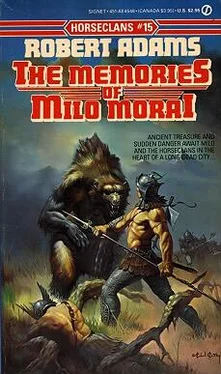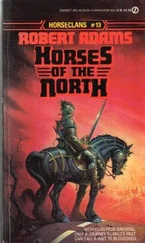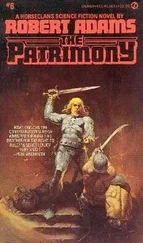Nor was food alone the value of the bull. The hide would be rendered into fine, strong leather and the hair into felt. Horn would become tools and implements; sinew, thread for sewing or making ropes. When steel needies were not available, slivers of bone could be made to serve that purpose, and still other pieces of bone, after fire-hardening and sharpening, were often used to tip hunting arrows. Cleaned and soaked and carefully stretched, then dried, the bull’s stomach pouches would become the inner linings of water containers; so too would his bladder. Hooves might be and often were rendered with fish offal to produce glue for a plethora of purposes, or sections cut from hooves made fine scaleshirts when sewed onto leather backing for war armor.
With the women, the children and Bard Herbuht fully occupied in camp, Milo took the cart down to the lake and washed off the blood, then he, Gy and two more of the Kindred warriors rode back to the ruin with the cart.
It was not yet noon when they arrived at their destination, but even so, the seven bodies dragged out and left upon the prairie on the afternoon before were already become only a few disjointed, widely scattered bones, all but invisible in the high grass.
As he had expected, the steel cabinets opened readily to two of the keys, and the contents were also about what he had been expecting, but more so.
The M-16s were there, three of them, but they were the selective-fire model, capable of full-automatic operation, which was unusual. There were four shot-guns—two short pumps and two doubles—an M-3A1 submachine gun, two scoped hunting rifles, three .22 caliber rifles and a dozen handguns of assorted calibers and sizes. There was enough ammunition to start a small-scale war and four hand-grenades. But one of the steel ammunition boxes proved to contain not cartridges or explosives but coins—rolls of silver dimes, quarters, halfs, dollars and Mexican five- and ten-peso pieces, plus a few other rolls of gold Kruger-rands, Mexican twenty- and fifty-peso pieces, and a few American gold pieces. This last box he took out and set aside.
All save one of the firearms he transferred to the larger of the steel cabinets, which was, he was glad to see, literally built into a corner of the room. After dropping the keys inside with the arms, munitions and grenades, he slammed the self-locking door upon the dangerous artifacts. There was no point in allowing any of the Horseclansmen to learn to use and depend upon weapons that they would find worse than useless after they had fired off all of the limited stocks of ammunition; bows and slings and darts had been sufficient to keep them fed and protected for nearly three hundred years now, and he had no intention of spoiling them with the incipiently deadly fruits of a long-dead technology.
The one pistol he retained was, he admitted to himself, partially a nostalgia trip. The .45 caliber M1A1 Government automatic was made mostly of stainless steel with a matte finish, but the heft and the feel were achingly familiar. He packed all of the .45 ammo he could turn up—five hundred plus rounds—the five magazines, the spare-parts kit, two holsters and a lanyard in a hinged, lockable 20mm ammo box, adding the .22 caliber conversion kit and a block of the small-caliber ammo for it, as well. The pistol would serve him as an emergency, last-ditch defensive weapon in its larger configuration and to take small game when traveling alone in its smaller. The time was quickly coming when he would be very glad that he had not locked away this weapon too.
Little Djahn Staiklee and Djim-Bahb Gahdfree came back into the camp in a little over a week—very good time for such a trip—both they and the two new young warriors who accompanied them back all whooping and chortling over their expertise at haggling. They had managed to convert the packhorse load of goods into not one but two carts, each of them complete with teams and harness, water barrels and spare parts and even kegs of grease for the axles and hubs, plus a twenty-pound sack of dried pinto beans and a fifty-pound sack of dry, shelled corn, both raided or traded from the Dirtmen by one or the other of the Kindred clans.
There were no spotted dogs with them when they returned, but in place of them were two big, wiry, tough-looking hounds of the sort that these southerly dog-clan folk called tooth-hounds—dogs bred and trained to hold dangerous game at bay and, if necessary, to close with and kill the beasts. Milo would have been happier if the young men had brought back no canines at all, but if they had to have dogs along, he agreed that these were the kind to have; any predator that chose to tangle with one or both of them would have its work cut out for it, no two ways about that matter.
During the afternoon and evening of the day of the return of Little Djahn Staiklee, everything but bare essentials was packed into the carts, and the next morning, the yurts were struck, folded and packed, the king stallion was requested to move the herd out and the party commenced a march to the environs of the large ruin that the young warriors had chanced across weeks before.
They moved like a migrating clan—Crooktail and Snowbelly ranging well out in front, zigzagging back and forth across the projected line of march, seeking out danger or game; next came the mounted warriors, riding well separated in a crescent that guarded both the van and the forward flanks; then came the six carts driven by the wives of Milo, Bard Herbuht and Gy Linsee; the horse herd followed, shepherded, kept moving, by the king stallion, Spotted One and Bard Herbuht’s children. At Milo’s order, the brace of tooth-hounds were led along on ropes tied to the tails of two of the carts, for the prairiecats did not like canines of any type or description and were big enough, strong enough and fast enough to quickly make a blood pudding of either of the dogs, if so inclined. Only the jaguar, Spotted One, seemed at all tolerant of the presence of the hounds on the march or in camp.
The ready bows and throwing-sticks and slings of the skirmish line of warriors garnered a goodly supply of rabbits and three small antelope of as many kinds during the day’s march, and Little Djahn Staiklee roped and strangled to death a large antelope, while the redoubtable Snowbelly came back as far as the line of horsemen dragging a large, fat, spotted sambar buck.
Although they moved like a clan, the small party moved much faster than a clan, lacking the slow, difficult job of herding the cattle, sheep and goats kept by clans for milk products and fiber. Therefore, they had covered more than half the distance to their objective by midafternoon and when they came upon an ideal campsite, Milo ordered a halt.
Although no one, not even the prairiecats, suspected it, however, they had been under observation throughout the day, and they still were as they settled into the night’s camp.
While the cats came into camp to eat, the young warriors and their two big dogs guarded the horse herd, not returning until the three feline guardians had once more assumed their vigil. When the party rode back in, Little Djahn Staiklee, the acknowledged leader of the group, sought out Milo.
“Uncle Milo, the horses all are restless this after-noon. The king stallion says that a strange cat has been sniffing around for days now, and it seems as if it trailed us here from the old campsite, too. You know, I’d been suspicioning that maybe Spotted One had been responsible for taking our hounds off, one at the time; teegrais always has had them a pure liking for dogmeat. But maybe I was wrong, Uncle Milo, maybe it’s another teegrai, a wild one, been stalking around camp wherever wewas .”
Milo frowned. “Surely the cats would have noticed if any of their wild cousins were getting close enough to us to present any danger to the horses—though, knowing them and their inborn and unconcealed pre-judices, they might have just neglected to mention any wild cat that was concentrating on killing, carrying off and eating dogs.”
Читать дальше












